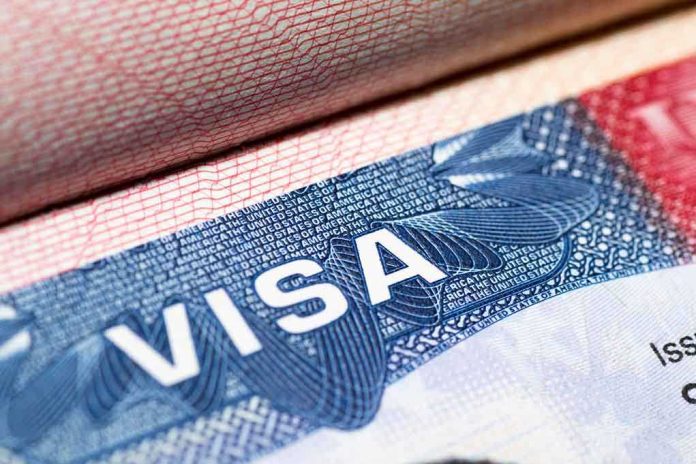
Every war leaves casualties, but the Republican battle over H-1B visas may wound America’s competitive edge before the smoke even clears.
Story Snapshot
- DeSantis orders Florida universities to end H-1B hiring, sparking fierce debate about academic freedom and labor policy.
- Trump proposes a $100,000 fee for H-1B applicants, facing backlash from business and tech leaders—and his own base.
- The GOP splits dramatically over immigration and skilled labor, with universities and industry caught in the crossfire.
- Experts warn Florida’s academic and tech sectors could lose global talent, risking research and innovation leadership.
Florida’s Aggressive Crackdown on H-1B Visas
Governor Ron DeSantis has commanded Florida’s state universities to cease hiring foreign workers via the H-1B visa program, asserting that institutions exploit the system to hire cheaper labor while sidelining qualified Americans. His directive landed in late October, ordering the Florida Board of Governors to “pull the plug” on H-1B hiring and triggering a rapid review of employment practices across public campuses. DeSantis’s message is unambiguous: protect American jobs, even if it means upending university staffing and research programs.
Florida’s universities are scrambling to respond. H-1B visas have long been essential for recruiting top-tier faculty, especially in science and engineering fields where domestic candidates are scarce. Academic leaders and faculty unions argue DeSantis’s move is politically motivated, legally questionable, and risks major disruptions. Public statements warn that the policy may force universities to cut specialized positions and jeopardize ongoing research, potentially hurting Florida’s reputation for academic excellence.
Trump’s Federal Fee Hike Sparks GOP Infighting
President Donald Trump, seeking a second term, recently announced plans to slap a $100,000 fee on new H-1B applications. The proposal was pitched as a way to safeguard American workers, but it ignited instant controversy—even among Trump’s own supporters. Business leaders, tech CEOs, and academic institutions protested, arguing the fee would block access to critical global talent and cripple innovation in U.S. industries.
Trump’s MAGA base is not united. While some cheer his aggressive stance, others see it as a betrayal of the practical needs of American business. Social media buzzed with open dissent, as conservative outlets and union representatives questioned whether Trump had abandoned core free-market principles. The fee proposal has not yet taken effect, but its mere suggestion has sown discord throughout the party and emboldened DeSantis’s own crackdown.
Universities and Industry Face Immediate Fallout
Florida’s universities are now auditing staff and grants tied to H-1B and diversity programs, bracing for possible layoffs and funding cuts. The tech sector, already anxious about talent shortages, warns that restrictions will ripple far beyond campus walls. If Florida becomes inhospitable to foreign experts, research programs may falter and startups could relocate to states with friendlier policies. Industry advocacy groups stress that the H-1B program fills critical gaps in STEM fields, not just entry-level positions.
Graduate student unions and faculty organizations are mobilizing in opposition, arguing that the crackdown is rooted more in anti-immigrant sentiment than sound economic policy. They point out that universities hire H-1B workers only when Americans with the required specialization cannot be found—a scenario increasingly common in advanced research. Meanwhile, students and researchers on H-1B visas face growing uncertainty about their futures in Florida, fueling anxiety and frustration in academic communities.
Long-Term Risks for Florida and the Nation
Experts warn that the combined effect of state and federal action could erode America’s global leadership in research and innovation. Florida’s universities risk losing their ability to attract international talent, with consequences for everything from grant funding to national rankings. If Trump’s fee hike takes hold, the chill could spread nationwide, driving skilled workers to other countries and weakening U.S. competitiveness in the knowledge economy.
The Republican Party now faces a stark choice: Double down on populist restrictions or heed the calls of industry and academia for a balanced approach. The outcome could shape not only the future of immigration policy, but also the very fabric of American higher education and technology. For now, Florida stands as the testing ground—and the country is watching to see which side prevails.







